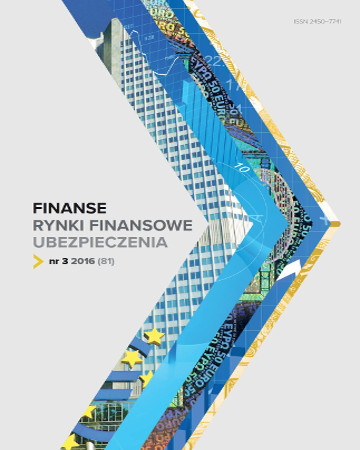
ISSN: 2450-7741
eISSN: 2300-4460
OAI
DOI: 10.18276/frfu.2016.4.82/1-21


Issue archive /
4/2016
Possible Applications of the Theory of Transaction Costs in Corporate Management
| Authors: | Justyna Suska |
| Keywords: | cost management economics of transaction costs information asymmetric institutional economy contractual theory of an enterprise |
| Data publikacji całości: | 2016 |
| Page range: | 13 (251-263) |
Abstract
Objective – transaction costs theory is one of three new – neoclassical – concepts of an enterprise, constituting the opposition to classical theories perceiving a company as a “black box”, that is a closed body (black box), the aim of the company is to effectively transform inputs into outputs. and the effectiveness analysis is performed through the prism of production costs. Market mechanisms regulate the functioning of the market, since companies operate on the market perceived as a sphere of confrontation between supply and demand (equilibrium of price). The neo-classical approach did not take into account the pressure of different institutions regulating the business activity environment. Neo-institutional theories focus on perceiving a company more broadly than as a “black box”, and through the prism of the production function. The aim of the article is to present scientific studies regarding the possibility of using the theory of transaction costs in enterprise management. Methodology of research – For the purposes of this study the following test methods were used: a critical analysis of professional literature, a diagnostic survey (scenario) and a comparative studies method. Moreover, methods such as synthesis, deduction and induction were used. Result – The studies demonstrated that the comparison of transaction costs should decide on the coordination of activities by a company and not by the market – if transaction costs are lower inside a company, it is profitable to organize the production within this company, if they are higher on the market than in the company – production of goods by the company will be unprofitable. In this context, it is important to take into account the internal solutions in companies – assuming that most of the factors of production are actually used by companies and the use of these assets is subject to the decisions of companies, and not directly to the activities of market forces. The functioning of the market depends, to a large extent, not on market forces, but on the manner in which companies operate. Originality/value – The conducted analysis provides the foundation for a discussion on the implementation of the transaction costs theory by, among others, the creation of purchasing groups in order to improve the negotiating position with partners (reducing the costs of searching for information) or the use of a third-party’s employees (temporary work – reducing the cost of production preparation).
Download file
Article file
Bibliography
| 1. | Chotkowski J. (2010). Market institutions and transaction costs – key notions in new institutional economy. Roczniki Nauk Rolniczych, 97 (2), 107–108. |
| 2. | Gorynia M. (2007). Studies on transformation and internatiolization of Polish economy. Warszawa: Difin. |
| 3. | Hardt Ł. (2006). Birth and evolution of the meaning of the transaction costs notion. Gospodarka Narodowa, 11–12, 1–23. |
| 4. | Klaes M. (2001). Begriffsgeschichte: Between the Scylla of Conceptual and the Hybrids of Institutional History of Economics. Journal of the History of Economic Thought, 23 (2),179. |
| 5. | Klaes M. (2000). The History of the Concept of Transaction Costs: Neglected Aspects. Journal of the History of Economic Thought, 22 (2), 192. |
| 6. | Klimczak B. (2005). Remarks on associations between the standard economy and new institutional economy. In: S. Rudolf (ed.), New institutional economy. Theoretical and practical aspects. Kielce: Publishing House of Higher Institute for Economics and Administration. |
| 7. | Kowalska K. (2005). Contractual and transaction costs in new institutional economy. Gospodarka Narodowa, 7–8. |
| 8. | Lichtarski J. (2007). Basics of knowledge on an enterprise. Wrocław: Publishing House of O. Lang Academy of Economics in Wrocław. |
| 9. | Małysz J. (2003). Institutions versus transaction costs in the light of neo-institutional economy. Ekonomista, 3, 315–340. |
| 10. | Stankiewicz W. (2007). Institutional economy. Outline of the lecture. Warszawa: PWSBiA. |
| 11. | Storrie D. (2002). Temporary agency work in the European Union. Luxembourg: European Foundation for the Improvement of Living and Working Conditions. |
| 12. | Williamson O. (1998). Economic aspects of capitalism. Companies, markets, contractual reactions. Warszawa: Wydawnictwo Naukowe PWN. |
| 13. | Wrońska E.M. (2012). Transaction cost theory versus Professional groups. Annales Universitatis Mariae Curie- Skłodowska Lublin – Polonia, 46 (1). |
| 14. | Ząbkowicz A. (2003). Modern institutional economy in the light of major economy trend. Ekonomista, 6, 795–823. |
| 15. | Zbroińska B. (2013). The contribution of transaction costs economy and theory of contracts as regards the studies on management. Studies and Materials of Jan Kochanowski University in Kielce, 2, 164–169. |